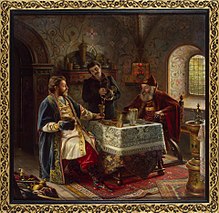Oskar Freiwirth-Lützow
Oskar Freiwirth-Lützow (* May 12, 1862 in Moscow , † May 3, 1925 in Füssen ) was a successful artist who painted in the style of bourgeois realism at the turn of the 19th and 20th centuries.
Oskar Lützow was born in Moscow on May 12, 1862, the son of Wilhelm Lützow, who came from Potsdam, and Karolina Lützow, née Kunkel. During this time, his father was employed as a senior engineer at the Moscow - Saint Petersburg State Railways . The mother came from a Swedish merchant family who immigrated to St. Petersburg. In her second marriage, Karolina Lützow was married to the general director of the Phönix-Werke in Riga, the engineer Oskar Freiwirth, who adopted the boy. Oskar's double name Freiwirth-Lützow also comes from this.
Art studies
First he began studying natural sciences in Bonn ; but he soon took private drawing lessons from Küppers. “ After three years he explained to his father outright that he was fascinated by art and he was given permission to attend the academy in Düsseldorf. “(Hans Roth) This was followed by a stay at Menn's art school in Geneva . He was a student of Ingres in Paris and Rome. From 1838 he was back in Paris and turned to landscape painting, where he became friends with Theodor Rousseau, Corot, Delacroix and pioneered the Barbizon School .
After studying in Rome in the studio of the painter Giuseppe Ferrari and in Paris in the student studio of Adolphe William Bouguereau and Toni Robert-Fleury , he most recently worked with the American artist Toby E. Rosenthal in his studio in Munich . From 1880 to 1882 Freiwirth-Lützow studied with Hugo Crola at the Düsseldorf Art Academy .
Artist career
In 1884 he began his independent artistic career. Since there were a lot of artists in Munich at that time, “it was much easier to paint pictures than to sell” (Hermann Roth). In 1890, he sent the St. Petersburg spring exhibition the painting A dear guest , that immediately by Grand Duke Alexander Mikhailovich was bought. His business in the Russian art market began to flourish. Tsar Nicholas II first bought his painting The Alchemist and in 1901 An Alchemist with Students . The social recognition was inevitable and he became a member of the exclusive Petersburg artist society, where he was even offered the presidency. But in 1899 he returned to Munich and successfully continued his artistic career there. In 1909 he received the second gold medal for the painting Die Gevatterin in the art exhibition in the Munich Glass Palace .
In Munich he was in great demand as an artist colleague: he sat on the committee of the Munich Artists 'Cooperative, was treasurer of the General German Artists' Cooperative and first chairman of the social association of Munich artists.
Art production and success
Oskar Freiwirth-Lützow was one of “the few successful painters and sculptors of the era” who was marked “by a huge overproduction of art in a barely manageable art business in which many saw themselves as geniuses and only a few were successful. The art exhibitions, at which year after year thousands of pictures and sculptures were offered for sale and very few works were actually acquired, decided on progress ”. ( Heinrich Klotz )
In artistic terms, Oskar Freiwirth-Lützow is a synthesis of different art movements from the last quarter of the 19th century: by Hans Makart on the one hand, Carl Spitzweg or Wilhelm Leibl on the other.
There the monumental image and there the supposed “happiness in the corner” or the “retreat to the village”.
He certainly owes the economic success of his art work to his intuition to meet the demand of potential buyers. " This art was of course mostly buyer-friendly and left little room for experiment ". ( Heinrich Klotz ) So his work remained largely unaffected by the painting style of Impressionism .
In 1912, the art critic Hermann Roth reported in his report about a studio visit to Freiwirth-Lützow: “You can't see a lot of pictures at Freiwirth-Lützow because he is in the fortunate position of selling them mostly off the easel. Germany, England and America share the possession of his pictures mainly with Russia ”.
Oskar Freiwirth-Lützow moved to Faulenbach near Füssen in 1913 and died there on May 3, 1925. He was buried in a grave of honor in the Füssen forest cemetery.
literature
- Hermann Roth: Oskar Freiwirth-Lützow. For his fiftieth birthday. in: Reclam's Universe, 1912.
| personal data | |
|---|---|
| SURNAME | Freiwirth-Lützow, Oskar |
| ALTERNATIVE NAMES | Lützow, Oskar (maiden name) |
| BRIEF DESCRIPTION | German painter of bourgeois realism |
| DATE OF BIRTH | May 12, 1862 |
| PLACE OF BIRTH | Moscow |
| DATE OF DEATH | May 3, 1925 |
| Place of death | Feet |
